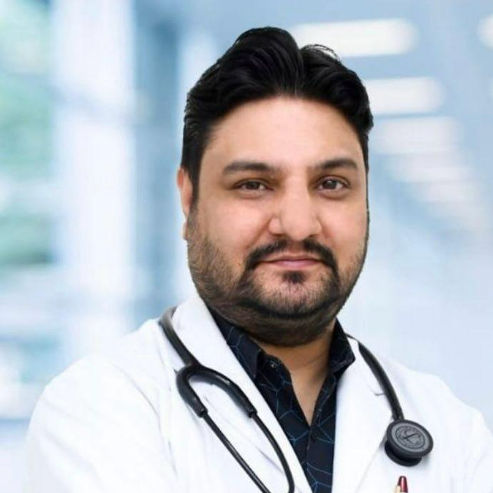Intestinal Obstruction
Know the facts on intestinal obstruction, its nature, causes, signs, management and prevention. Get to know how timely care and healthy habits help overcome it.

Written by
Last updated on 3rd Jul, 2025
Intestinal obstruction is a life-threatening condition in which the passage of food and water through the intestines is hindered. It can take place in the small or large intestine because of factors like tumours, adhesions, or inflammation. This blockage may cause various problems, such as infection, dehydration, or tissue damage. Hence, early diagnosis and treatment are very important to eliminate complications and boost the digestive system, which helps people lead a healthy life.
Types of Intestinal Obstructions
There are various categories of intestinal obstructions, and every category has specific causes and symptoms. The types are:
Mechanical Obstruction: This type occurs when a physical barrier such as a tumour, a hernia, or an enlarged organ places an obstruction in the gastrointestinal tract, thus preventing the passage of food or fluid.
Functional Obstruction: This is also known as paralytic ileus. This occurs when the muscle or nerve of the intestine is not in a position to work properly, therefore, no normal movement occurs.
Simple and Strangulated Obstructions: A simple obstruction just jams the intestine without compromising the blood supply, while a strangulated obstruction compromises the blood supply, thus leading to the ischemic death of tissues.
Partial and Complete Obstructions: Partial obstruction permits partial movement, while complete obstruction blocks the passageway, resulting in more serious symptoms.
Causes of Intestinal Obstruction
Intestinal obstruction may develop due to different causes. The following are the key ones:
Adhesions: Adhesions are scar tissue bands that develop following surgery or an infection. These agents can cause part of the intestines to stick together, forming a clot.
Tumours: Intestinal tumours include both benign and malignant tumours that grow inside or outside the intestinal walls, thus narrowing the passage and hindering the regular flow.
Hernia: A hernia happens when part of the intestine pushes through a weak spot in the abdominal wall and may result in a blockage.
Intestinal Strictures: Strictures are unusual narrowing in the intestine, due to inflammation or injury and may result in partial or complete obstruction.
Volvulus and Intussusception: Volvulus is a condition in which the intestine twists to create an obstruction, and intussusception is a condition in which some part of the intestine folds into another, creating a blockage.
Symptoms of Intestinal Obstruction
Early signs should be identified to eliminate an escalation of the situation. Below are the key signs:
Abdominal pain and cramping
Bloating and swelling
Nausea and vomiting
Constipation or a problem with bowel movements
The symptoms in the early stages may be minor, but the patient develops more intense signs as the contraction continues. Persistent pain, vomiting, and an enlarged abdomen are the warning symptoms that point out a complete blockage and need prompt medical intervention.
Diagnosis of Intestinal Obstruction
Evaluating the situation in time means an accurate diagnosis of the severity and cause of the obstruction. Key methods include:
Physical Examination: The doctors perform examinations for swelling or tenderness in the abdomen or the presence of abnormal sounds from the stomach.
Imaging Tests: Imaging examinations are usual before surgery and may include X-rays, CT scans, or ultrasounds that show where and what kind of blockage is present.
Laboratory Tests: Blood tests may show some conditions associated with the obstruction, such as infection or dehydration.
Endoscopy or Colonoscopy: These procedures enable direct observation of the intestines to check for tumours, structures, or any other abnormalities.
Get Tested Early for Accurate Diagnosis of Intestinal Obstruction
Treatment Options for Intestinal Obstruction
Intestinal obstruction management depends on the cause and the level of blockage present. The following are key approaches:
Medical Management: Pain relievers, antiemetics, and laxatives help manage symptoms. A nasogastric tube may relieve fluid and gas buildup, while IV fluids address dehydration.
Surgical Interventions: Surgery is performed to remove blockages like tumours or adhesions and to treat conditions such as twisted intestines, hernias, or injuries.
Emergency Care: Severe symptoms like intense pain, vomiting, or swelling require immediate care. Urgent surgery is needed if blood flow is interrupted or strangulation occurs.
Recovery involves reintroducing food gradually, maintaining hydration, and managing symptoms. Weekly follow-ups help monitor complications or recurrence.
Complications Associated with Untreated Intestinal Obstruction
If left untreated, intestinal obstruction has methods of threatening complications and is a severe condition. They are:
Bowel Perforation: Sometimes, a clogged intestine can tear, which leads to spillage of bowel content into the abdominal cavity, causing peritonitis, a serious infection.
Sepsis: If bacteria from the intestine move into the bloodstream, it results in sepsis – a life-threatening infection that affects many organs.
Ischemic Bowel: When the blood supply to the intestine is impaired, it results in an ischemic bowel that leads to tissue damage. This may call for surgical resection of part of the intestine.
Long-Term Digestive Issues: If the causes of such symptoms are not addressed, the patient may develop long-standing issues like malabsorption or chronic pain.
Prevention of Intestinal Obstruction
Measures to prevent the incidence of intestinal obstruction are also available. Here are key strategies:
Healthy Diet: Fibre intake prevents the formation of constipation, thus reducing the risk of obstruction of the colon.
Hydration: Taking more fluids keeps the bowels moving and does not allow for a situation whereby somebody is dehydrated and faces obstruction.
Regular Exercise: Physical activity helps to promote bowel movements and inhibit the development of the slow-moving bowels that lead to blockage.
Managing Underlying Conditions: Crohn’s disease, hernias, or even tumours require appropriate treatment so that they do not cause obstructions and other related complications.
Avoiding Smoking: Smoking can contribute to various diseases such as Crohn's disease and other diseases that affect the intestines and create blockages.
Regular Medical Check-ups: Medical check-ups from time to time are good for identifying things like hernias, Crohn's disease, or any other diseases that may turn chronic if not diagnosed early.
Prognosis of Intestinal Obstreperous
The result depends on the treatment planning and the cause. Here are the key elements that affect the outcome:
Factors Affecting Recovery: Some of the factors that are key to determining the outcomes for the patients include early diagnosis, the level of obstruction, and immediate intervention.
Long-Term Management Strategies: Good compliance with the medical regimens of the basic diseases, periodic reviews, and necessary modifications to lifestyles all enable the patients to avoid any relapses and maintain their overall health.
Impact of Complications: Risks like advancement to severe peritonitis, bowel perforation, or sepsis change the duration of the healing process or worsen the overall outcome of the individual.
Importance of Post-Treatment Care: Adherence to physicians’ recommendations concerning medication and diet makes a huge contribution to the recovery process.
Conclusion
To sum up, intestinal obstruction is a dangerous condition that requires immediate treatment. To tackle this condition, one should know the regular signs and their causes and get medical help. Early intervention may avert further complications. Also, future problems can be prevented by certain lifestyle changes such as eating right, exercising, getting checked up, and controlling chronic diseases before further complications. Taking these steps ensures better digestive health and reduces the risk of obstruction, making proactive care essential for overall well-being.
Consult Top Gastroenterologists
Consult Top Gastroenterologists

Dr Bhargav Vuppumalla
General Physician/ Internal Medicine Specialist
5 Years • MBBS MD GENERAL MEDICINE
Bengaluru
Apollo Medical Center, Marathahalli, Bengaluru

Dr Harish K C
Gastroenterology/gi Medicine Specialist
15 Years • MBBS MD DM MRCP(UK) (SCE-Gastroenterology and Hepatology)
Bangalore
Manipal Hospital, Bangalore

Dr. Shivaraj Afzalpurkar
Gastroenterology/gi Medicine Specialist
13 Years • MBBS, MD General medicine (Gold medalist), DrNB (Gastroenterology), MNAMS
Bengaluru
Apollo Clinic, JP nagar, Bengaluru

Dr. Paramesh K N
Gastroenterology/gi Medicine Specialist
16 Years • MBBS, MS ( General Surgery), DNB ( Surgical Gastroenterology)
Hyderabad
Sprint Diagnostics Centre, Hyderabad

Dr. Amit Pandita
Gastroenterology/gi Medicine Specialist
10 Years • MBBS. MD (INTERNAL MEDICINE) DrNB (GASTROENTEROLOGY AND HEPATOLOGY)
Delhi
Apollo Hospitals Indraprastha, Delhi
Get Tested Early for Accurate Diagnosis of Intestinal Obstruction
₹395(₹988)60% off
